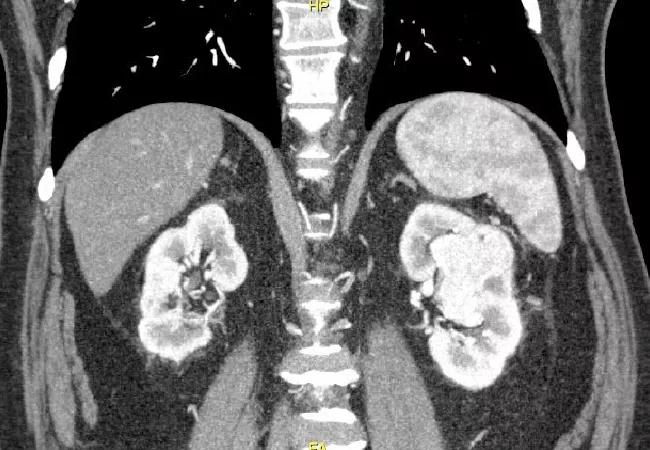Immune suppression could improve treatments

By Samuel Haywood, MD
Advertisement
Cleveland Clinic is a non-profit academic medical center. Advertising on our site helps support our mission. We do not endorse non-Cleveland Clinic products or services. Policy

Samuel Haywood, MD
More than 60,000 Americans are diagnosed annually with renal cell carcinoma (RCC), one of the most lethal genitourinary malignancies. Overall mortality rates can reach 20 to 30 percent.
Unfortunately, about one-quarter of patients present with locally advanced or metastatic disease, and approximately 30 percent of cancers will recur after initial treatment. Despite advances in treatment strategies, metastatic renal cell carcinoma (mRCC) largely remains an incurable disease.
Tyrosine kinase inhibitors (TKIs) are the gold standard for treatment of mRCC. While TKIs have been proved to prolong survival, patients eventually develop resistance and experience progression of disease. As such, there is considerable effort underway to develop additional mRCC treatments.
Immunotherapy has shown promise in the treatment of many malignancies, with RCC an excellent example. RCC is one of a few malignancies (along with melanoma and head and neck cancer) associated with known defects in the immune system, and further understanding of this immune suppression would pave the way for improved treatments.
Research conducted in the laboratory of James Finke, PhD, of Cleveland Clinic’s Department of Immunology has focused on this issue. A population of cells called myeloid-derived suppressor cells (MDSCs) is present in increased numbers in RCC tumors, resulting in an immunosuppressive environment. This allows cancer cells to escape the body’s normal immune response. The presence of MDSCs is associated with poor outcome in RCC.
Advertisement
One proposed immunotherapy for mRCC is a new class of drugs called checkpoint inhibitors. Normally, the immune system has a checkpoint process to prevent excessive immune reactions. In RCC states, a ligand-receptor complex of programmed death-1 (PD-1) and programmed death ligand-1 (PDL-1) is abnormally expressed, and the binding of this complex acts at this checkpoint to suppress the anti-tumor immune response.
Inhibition of this checkpoint interaction “releases the brakes” on the immune system and allows the body to attack the tumor. Preliminary clinical trials of antibodies against PD-1 and PDL-1 have shown promising results in several malignancies, including RCC. However, it is currently unknown if this PD-1/PDL-1 complex is present on MDSCs in RCC. The interaction of TKIs with these checkpoint molecules is also unknown. A series of experiments in the Finke laboratory is underway to further elucidate this relationship.
We first obtained blood and tumor samples from patients presenting for resection of localized RCC. A total of seven patients provided blood and 16 patients provided tumor specimens. These were processed and flow cytometry was performed to analyze expression of various cell surface markers.
The analysis demonstrated expression of PDL-1 on MDSCs, both circulating and within the tumor itself. This molecule was present in variable amounts among patients, but 10 to 20 percent of all MDSCs expressed PDL-1. With respect to PD-1, this receptor was found to be expressed on T cells in peripheral blood and within the tumor milieu. Its presence was seen on both CD4 T-helper cells and CD8 cytotoxic lymphocytes, and initial analysis suggests upregulation of PD-1 expression within the tumor environment as compared with circulating blood. Taken together, the results of this first experiment definitively demonstrate the presence of this important complex on MDSCs within the kidney cancer setting.
Advertisement
The second phase of the study examined the effect of the PD-1/PDL-1 complex on RCC patients treated with TKI therapy. Tumor samples were obtained from RCC patients in three groups: no treatment prior to surgical resection (control), neoadjuvant treatment with sunitinib and neoadjuvant treatment with axitinib. Immunohistochemistry was performed on these tumor samples to assess for levels of immune cell infiltrate as well as the PD-1 molecule. Initial analysis with a small pilot sample demonstrated increased immune cells infiltrating the tumors treated with TKIs as well as modest decreased expression of the immunosuppressive PD-1 molecule. Review and data analysis of the entire cohort is continuing.
Immunotherapy holds much promise for improving treatment of mRCC. In particular, checkpoint inhibition of the PD-1/PDL-1 axis is an evolving area of research with direct clinical applications. Ongoing studies will further elucidate the interaction between the immune system, RCC and immunotherapeutic treatments, and this knowledge will help researchers design new treatment strategies for these patients.
Dr. Haywood is a resident in Cleveland Clinic Glickman Urological & Kidney Institute’s Department of Urology.
Advertisement
Advertisement

First-of-its-kind research investigates the viability of standard screening to reduce the burden of late-stage cancer diagnoses

Global R&D efforts expanding first-line and relapse therapy options for patients

Study demonstrates ability to reduce patients’ reliance on phlebotomies to stabilize hematocrit levels

A case study on the value of access to novel therapies through clinical trials

Findings highlight an association between obesity and an increased incidence of moderate-severe disease

Cleveland Clinic Cancer Institute takes multi-faceted approach to increasing clinical trial access 23456

Key learnings from DESTINY trials

Overall survival in patients treated since 2008 is nearly 20% higher than in earlier patients